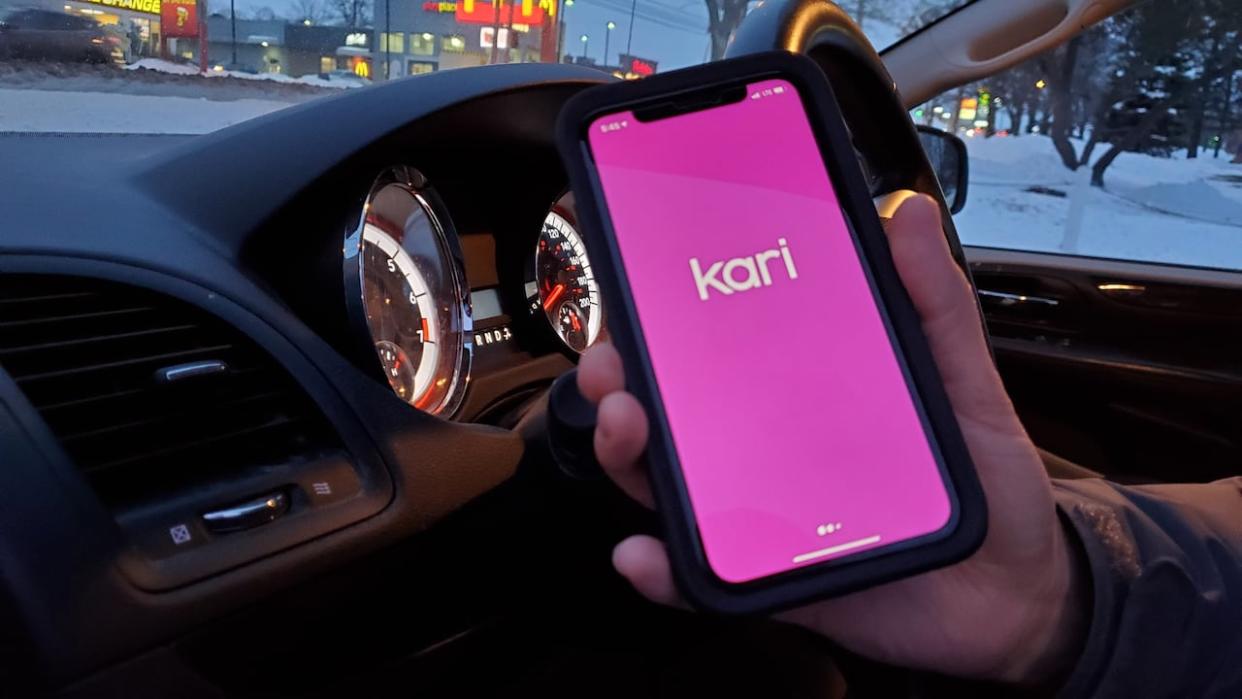Ride-hailing service on way to St. Stephen

Without a car, it can be hard to get around St. Stephen.
But next month, there's a new option in town.
Kari, a ride-hailing app based in and currently operating across Prince Edward Island, will launch in St. Stephen on May 1 as a six-month pilot project.
"We've had huge success in P.E.I. … I think St. Stephen is just one of the places that we're looking at in more of a rural setting in New Brunswick," Kari co-founder Matt MacLeod said in an interview.
Kari primarily serves Charlottetown but offers service to most of the Island through pre-booking. The app-based service gives thousands of rides a week in P.E.I., MacLeod said.
The service, which also exists in Fredericton, is coming to town in partnership with community group Future St. Stephen. The interim president, Jeremy Barham, said it's a much-needed service.

There are no options now in St. Stephen for those without access to a car. (Sam Farley/CBC)
"If you don't have a car, you can't get anywhere in town, really — unless you've got lots of friends to take you where you need to go, or you use your legs, which most people have to do."
With a population of roughly 4,500, there is no public transit in St. Stephen.
The only service is Dial-a-Ride Fundy Regional Transportation, which offers pre-arranged services to low-income, rural, and mobility-limited residents. Its website says services are currently suspended.
"You know, it's not a tiny town and it takes a while to get across town to get groceries, get to medical appointments, get to work," Barham said. "So if you don't have a car, it is pretty difficult."
Kari is similar to Uber, Barham said. You just download the app and select a destination. He added that Kari is trying to keep rides in town under $10 and has already started to recruit drivers.
![The university's interim president, Jeremy Barham, says the donor who funded the program 'wanted to level the playing field and make [SSU] as accessible as UNB or the other provincially-funded universities."](https://s.yimg.com/ny/api/res/1.2/nXDyBo8fnxXocfcYp2k5hg--/YXBwaWQ9aGlnaGxhbmRlcjt3PTk2MDtoPTYzNA--/https://media.zenfs.com/en/cbc.ca/af4882dd2e0271ced8f8273115ca70fd)
Jeremy Barham, interim president of Future St. Stephen, collaborated with Kari executives to bring the service to town. (Julia Wright / CBC)
"It's an experiment," he said. "As far as we know, there are no other rideshare companies trying out rural service," Barham said.
He's hoping it will be proven that rides-hailing has a business case in rural New Brunswick, so the service can eventually be expanded.
"In our dreams we will expand to Saint Andrews and St. George, the next closest towns to St. Stephen, and then we hope it could be a solution for rural New Brunswick in general."
Town underserved
MacLeod said markets like St. Stephen are chosen not for large populations but because they're underserved by other options.
So by having the chance for people to go to and from the grocery store or to a doctor's appointment or to the pharmacy, by giving them the option to have a service that is available, reliable, affordable, convenient," MacLeod said, "That's really where we are striving to kind of hit our niche."
Drivers and their vehicles are vetted, MacLeod said, and are also covered by the company's commercial insurance.
"I think the biggest thing is giving people the opportunity to try it."
Ride-hailing can combat impaired driving
Not only will the service help people get to work, shopping and appointments, but it will also help fight impaired driving, MacLeod said.
That's something that Steve Sullivan, CEO of Mothers Against Drunk Driving Canada, agrees with.
"I think from MADD Canada's perspective, the more options that people have to get home safely, the better," Sullivan said.
"And so ride sharing is certainly part of that equation."
While there is never an excuse to drive impaired, Sullivan said, rural areas like St. Stephen can have fewer options for people to plan ahead for transportation when they're drinking.
"And the fact that they have an option now, I think, will be really important for people and to make those choices and even to plan ahead," Sullivan said.
"I know I'm going to be drinking, so I'm going to take the ride sharing to and from wherever I'm going."

